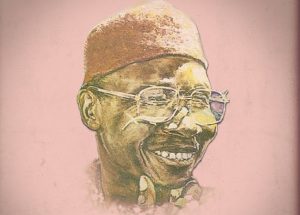
Stephen Osadebe Osita; musician credited with contributions to the growth and development of highife as well as re-inventing the music. Osadebe was the first highlife musician to bring in a Cuban sound, mixing it with meringue and rumba. By so doing, Osadebe kept his style of highlife totally different from other higlife musicians. His music is often considered as having spiritual undertone because of its lyrics but he remarked it was no more than an instinct from God. Rivalry once existed between him and Oliver de Coque, a relatively younger musician who came short of challenging him to a fight. There were also collaborations with Zeal to do Oyimlotan, which became a big hit[i].
Born in 1936 in Umuekeke, Atani, in Ogbaru Local Government Area of Anambra State, Osadebe began his professional musical career in 1956, after stints with Marakas players under the leadership of Stephen Amaechi Nnanyeiugo and a handful of other musicians like E.C. Arinze, Adeolu Akinsanya and Zeal Onyia. The early years of his career were dominated by the struggle to convince his parents that he had not made a wrong choice by becoming a musician. First, he proceeded to the Soviet Union for further studies, ostensibly to show his thirst and desire for higher learning. Osadebe also managed to stay off the misdemeanours for which musicians are known, apparently to prove that musicians are not necessarily uncouth.
Within a few years, he had mastered his art. Aside arranging and composing his songs, Osadebe also played wind and string instruments, which are fundamental to highlife. He dedicated himself to his job, excelling in his composition and delivery of Amakekwu and Agidigbo, two music forms that were quite popular, particularly among the igbo of Eastern Nigeria. Less than a decade after, Osita Osadebe’s band, Nigerian Soundmakers International, bad established it self among highlife lovers who had followed his gradual climb. Soon, he earned the name “Doctor of Hypertension.” The name came as a result of the perception that his music, rich in philosophy and igbo proverbs, was therapeutic in nature. The popular tunes of that era included No Money No Woman, Enyi Mba Enyi, One Pound No Balance, Ononuju Aku, Onu Kwuru Njo and many others. But like many Igbo musicians, Osadebe was adversely affected by the Nigerian Civil War.
After the war, Osadebe returned to the studio, determined to regain lost ground. He achieved that with Osadebe 75, released on the Polygram Records label. More success came with Osondi Owendi, which was to become Nigeria’s highest selling album, and Makojo. Osadebe was not only gifted but also prodigious. In a career that spanned over Five decades, the higlife icon composed nearly 500 songs that appealed to the Igbo and non-Igbo alike. One of his last major releases was Kedu America. Though inspired in the United States during one of his visits, the five-track album which contains songs like Onuigbo, Kanyi Jikoiu, Nyem Obi Gi, Agbaiu Aka Ngozi Ani and Nwannem Ebezing remains one of his vintage compositions. In Kedu America, which contains interviews, Osadebe attempted to answer a few questions on his music, vision and the challenge of sustaining any successful endeavour[ii].
[i] The Guardian 1 October, 2009
[ii] The NEWS 28 May, 2007
